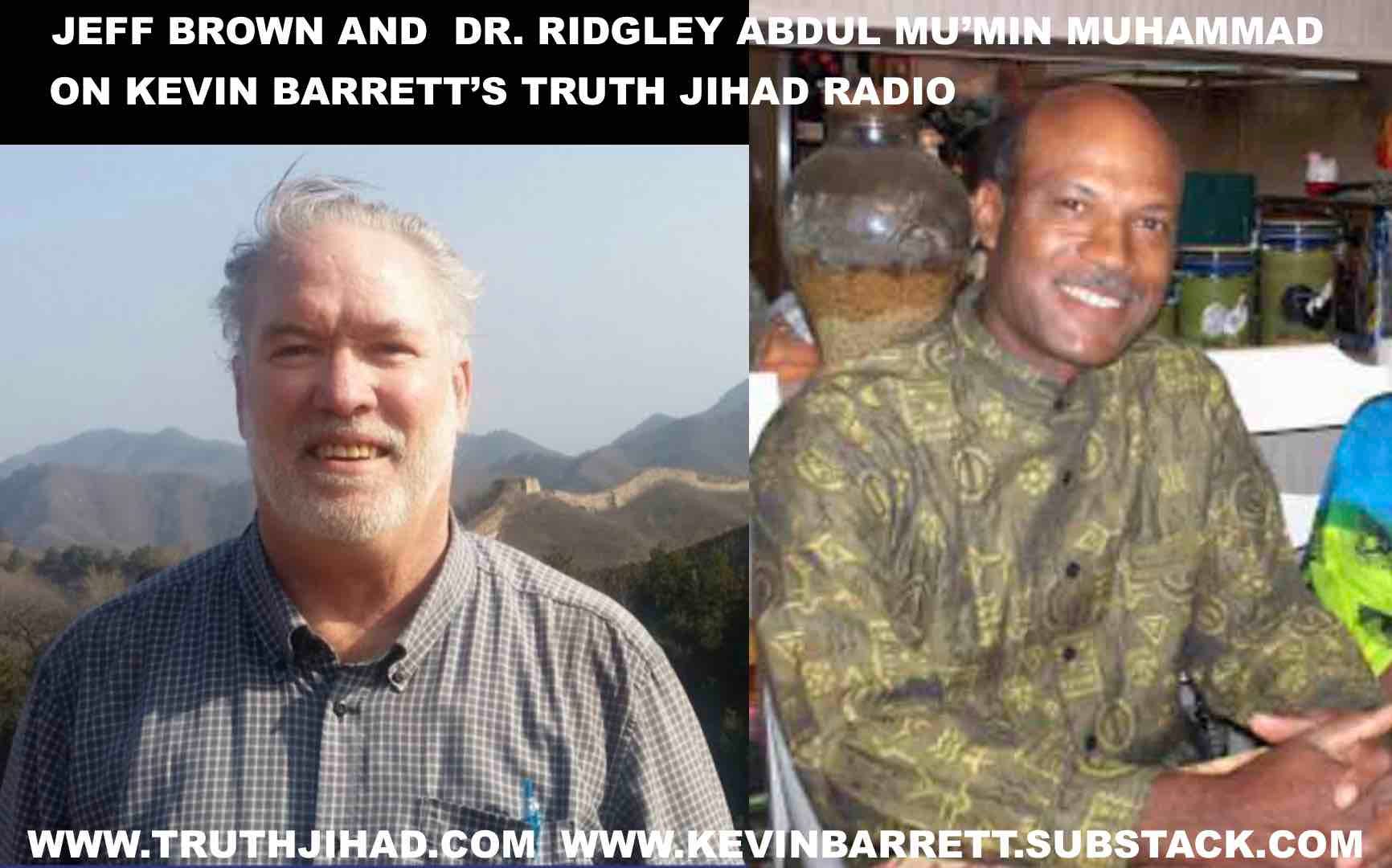
Ramadan, Climate Change, Xinjiang, "Redemption Through Genocide"...and Much More
 2024-03-08
2024-03-08
Listen live Fridays noon to 2pm Eastern on Revolution.Radio later archived at my Substack.
A while back I contacted Dr. Ridgely Abdul Mu’min Muhammad of the Nation of Islam Research Group (NOIRG) to ask about the Nation’s position on the genocide in Gaza. That question was answered by the Honorable Minister Louis Farrakhan’s February 25 Savior’s Day speech, published in The Final Call as “The Genocide of Palestinians: A Test for The Whole Human Family.” Tonight Dr. Ridgely and Jeff Brown of China Rising will discuss the Gaza genocide, among other topics, on my live radio show.
Tomorrow’s False Flag Weekly News covers the week’s most notable 30 stories, including Barnett Rubin’s remarkable “Redemption Through Genocide.” Rubin’s observation that Zionism is an outgrowth of messianic millenarian heresy echoes what people like me and Yusuf Hindi have been saying for years. But Rubin has an impeccable establishment resumé. Maybe he’ll help Hindi and me get some traction?
Ramadan kareem! The holy month of fasting is expected to begin Sunday or Monday evening in most parts of the world. Above is the video, and below is a partial transcript, of last year’s khutba delivered on the Friday before the beginning of Ramadan.
We are in the last Juma before the beginning of the holy month of Ramadan. So I'm going to talk a little bit about Ramadan and about inviting people, including non-Muslims, to share in Ramadan as a kind of dawah, an expression of what Ramadan is all about.
So what is Ramadan all about?F The first place to look is in Surat al-Baqarah 2:183) Believers! Fasting is enjoined upon you, as it was enjoined upon those before you, that you become God-fearing. (2:184) Fasting is for a fixed number of days, and if one of you be sick, or if one of you be on a journey, you will fast the same number of other days later on.
Another translation of that would be to become God conscious, to have taqwa, to have an awareness, a direct awareness of the reality of God. And that raises the question, how does fasting make you more mindful of God?
If we reflect on this—and the Quran does tell us to reflect, tells us to fakkur, to contemplate, to use our aql, our reason—and so we reflect on this and we use our reason and we realize that fasting makes us conscious of our dependence on God.
When you're hungry and when you're thirsty, when you're not eating even though your stomach is telling you that you want to eat and you're not drinking any water even though your body is telling you that you want a drink of water, your mouth is dry and you feel kind of lightheaded and normally if you were just following your instincts the way we usually do throughout 11 months of the year, you'd probably look around for a drink of water.
But during Ramadan, you don't. You use your consciousness and your willpower to not be a slave of your body and your physical desires. And as you feel that serious thirst, hunger, lightheadedness, first two days maybe a little bit of a headache, especially if you're withdrawing from caffeine, as I sometimes am.
You start to realize how there's a limit to how much time you really can go without eating and especially drinking water. If you don't have drinking water after a day or two you're in pretty bad shape. I forget what the limit is but you'll die after a pretty limited number of days. And the same is true although you have a lot more days if you don't have any food.
So we're really dependent on the rizq (provision) that Allah provides. We're dependent on the provision that Allah has given us. And fasting makes us aware of that dependence. We realize that if it weren't for all of this abundance that Allah has blessed us with in this beautiful creation…
…Among the first names of Allah is Ar-Rahman Ar-Rahim, the compassionate, the all merciful. And mercy and compassion being the first two tangible characteristics of Allah that we invoke every day when we pray. When we fast, we're reminded to feel mercy and compassion for those who don't have enough to eat or drink. And unfortunately our world hasn't yet reached the point that there aren't any people like that. Unfortunately there are probably hundreds of millions of people who are undernourished. And we should be figuring out ways to help them and to fix this kind of situation and to give the blessings of Allah to everybody and to try to take care of everybody which is the basic imperative of Islam.
We need to feel that compassion for others and for the less fortunate. And when we fast, we feel what it feels like to be deprived of food and drink. And that helps us to feel that compassion for the needy. And that's a form of God consciousness.
If you don't feel any compassion for people who are suffering, then you're not very conscious of God. Your taqwa level is not very high.
And to the extent that you're more conscious of God and God's mercy and compassion and injunction to our mercy and compassion, you're going to feel that mercy and compassion too. And you're going to want to help the people who are suffering.
So that's another way that fasting brings us closer to Allah. It gives us taqwa or God consciousness.
And finally, there's a third way that fasting helps make us conscious of God, gives us taqwa, and that is that it kind of starves our ego into submission. In normal life, our normal ego, our sense of self, the difference between me and everything else, is something that develops in little babies at a pretty early age. But when they're first born in their very earliest period of life, the baby hardly really even knows the difference between itself and the world. It's all just one.
And then the baby gradually learns to distinguish itself from the world…
…So, when you fast, you're kind of disconnecting from that part of yourself that always wants more, more, more for me, me, me. Because that part of the self is kind of plugged into the appetite. And when you cut off the appetite, you just use your willpower to overcome the power of appetite to turn you into a slave of your hunger and your thirst and your other desires. Your willpower overcomes that.
When we are in a separate ego, we're separate not only from the world around us but from Allah subhanahu wa ta'ala as well and His tawhid, His absolute oneness. And when we fast and we starve our ego into submission, we then perceive everything without that filter of self, distorting everything. And we see Allah's beautiful creation.
We also hear that we should fast for a prescribed number of days and that if you can't for a reason of hardship you can sort of make up for it by feeding the hungry, but it's better for you to fast, if only you knew. And that final part of this next ayah, which is Surah al-Baqarah ayah 184, is often cited in terms of that last part, that it's better for you if you only knew.
وَاِدْ تَسُومُوا خَيْرٌ لَكُمْ اِنْ كُنْتُمْ تَعْلَمُونَ
It's better for you if you only knew.
(It is hard to) sense that it's better to not eat, to undergo this fairly difficult fast of no food, no drink during daylight hours or even from the first light of dawn until sunset. It feels like kind of a difficult thing to do.
It's not that we're being told to do it to make us miserable. It's not a punishment. We don't really have much of a divine punishment complex in terms of just being a human being on this earth. We're not being punished.
Ultimately there is a reward and a punishment. There's the fire in the garden based on how well we do in the test of this life. And that comes in the afterlife, that reward or punishment.
But the fasting is not like a punishment for something. We're not expiating a sin or anything like that.
''Science Will Tell You That Fasting Is Better For You Than Not Fasting''
Drinking booze has, there's some good in it and there's some bad or khamr of the wine. There's some good and there's some bad but the bad outweighs the good. Well it turns out that that's pretty much what science says now about alcohol. That it produces a feeling of euphoria but it's very short lasting. And when it goes away in just like a half an hour for somebody takes a drink of alcohol, they're worse off than they were before.
Just like with the case with alcohol, the scientific research has started to catch up with the reality that was described in the Quran 1400 years ago. The reality is that fasting is good for you physically. It's obviously good for weight control and part of the reason for that is that it leads to more growth hormone. And the growth hormone tends to give you more muscle mass and more physical bodily strength and ability. It makes your body younger and indeed that's just one of the ways that fasting slows the aging process.
But if those people had just listened to the Koran, 1400 years ago everybody would have started fasting because it told us that it's better for you.
And of course it's better for you spiritually as well. We just went over some of the reasons for that, talking about the verse about it's prescribed for you so that you will have God consciousness or taqwa.
So Ramadan is the month when the Quran was revealed as a guide for humanity with clear proofs of guidance and the standard to distinguish between right and wrong. That prescription is for humanity. It's actually everybody should be joining us in this fast. It's not just something for the Muslim community that there's no point in anybody else doing.
No, this is actually something that's good for you
So, ya Allah, please do bless us with the chance to share the benefits of the fast of Ramadan with everyone.
This is a public episode. If you’d like to discuss this with other subscribers or get access to bonus episodes, visit kevinbarrett.substack.com/subscribe
More Episodes
 2022-12-31
2022-12-31
 2022-12-18
2022-12-18
 2022-12-11
2022-12-11
 2022-12-03
2022-12-03
 2022-11-21
2022-11-21
 2022-11-07
2022-11-07
 2022-10-22
2022-10-22
Create your
podcast in
minutes
- Full-featured podcast site
- Unlimited storage and bandwidth
- Comprehensive podcast stats
- Distribute to Apple Podcasts, Spotify, and more
- Make money with your podcast
It is Free
- Privacy Policy
- Cookie Policy
- Terms of Use
- Consent Preferences
- Copyright © 2015-2024 Podbean.com





